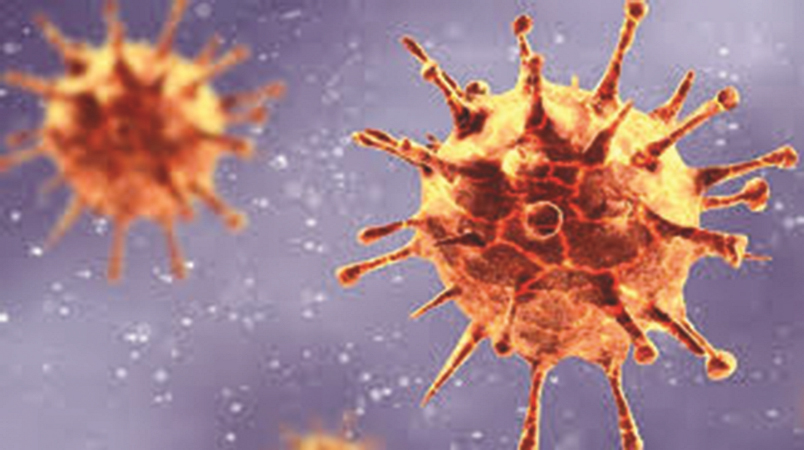New coronavirus mutant poses risk to Nepal: Experts

By Aashish Mishra
Kathmandu, Dec. 25: The Civil Aviation Authority of Nepal issued circulars to all international airlines on Tuesday asking them to not board any passengers originating from or transiting through the United Kingdom (UK) on planes coming to Nepal. The authority stated in the circular that the decision was taken in light of the new strain of the coronavirus spreading in the UK.
The strain, named VUI – 202012/01, is considered to be 70 per cent more infectious than the common strain of the virus and has prompted the governments of more than 40 countries to restrict travel from the UK.
According to the World Health Organisation, this new strain has also been detected in the Netherlands, Denmark and Australia while a different coronavirus variant has been identified in South Africa.
Risk to Nepal
Even though there are no direct flights between Nepal and the UK and the two countries are geographically far apart, experts say that the possibility of this variant of the virus, which was first detected in September, entering Nepal cannot be ruled out.
“The possibility of the strain spreading in Nepal remains. We cannot stay insulated from the rest of the world,” said Dr. Sameer Mani Dixit, general secretary of the Nepal Public Health Foundation and director of research at the Centre for Molecular Dynamics Nepal.
Similarly, Dr. Samir Kumar Adhikari, joint spokesperson at the Ministry of Health and Population, said that the strain could spread in Nepal, as in any other country across the world.
Stating that India could potentially be the path through which the virus enters our country, Adhikari emphasised the need for vigilance and monitoring. But he said that it was too early to draw any conclusion because the novel mutation is still being studied.
Moreover, Dixit said that even though the UK variant was more contagious, there was no evidence yet to suggest it is stronger or more fatal. Both he and Adhikari asked people to continue following precautions like wearing masks, washing and sanitizing hands and maintaining the prescribed physical distance.
Identification
In order to identify the new strain if it enters Nepal and check whether it already has, the government plans to collect samples and conduct genetic sequencing, according to Dr. Adhikari.
A decision to this effect was also taken by Wednesday’s meeting of the Incident Command System chaired by Minister for Health and Population Bhanu Bhakta Dhakal.
Dr. Pradip Gyanwali, member secretary of the Nepal Health Research Council (NHRC), told The Rising Nepal that the Council plans to coordinate with the government to track down the people who have arrived from the UK before the entry ban and collect their samples. The samples that test positive for the coronavirus will then be used for genetic sequencing.
“We have already begun searching for the individuals in coordination with the Ministry of Health and Population (MoHP),” Gyanwali said.
NHRC was also working on conducting a second genetic sequencing study of the coronavirus. The first study had found that the strain spreading in Nepal was similar to that of the virus spreading in India. “Work on sequencing the samples for the UK variant and conducting the second study will now be done simultaneously,” Gyanwali said.
Vaccine implications
“It is too early to know if and how the mutation will impact vaccine efficiency,” shared Dr. Jhalak Sharma Gautam, chief of the Child Health and Immunisation Service Section of MoHP.
He remarked that many researchers in many different countries were looking into the matter and we would have to wait to see their findings before stating anything.
It is to be noted that the new variant has mutations in the spike protein that the leading vaccines – Pfizer-BioNTech and Moderna – are targeting. However, currently, scientists the world over agree that it takes more than one single change to hamper the effectiveness of the jabs.
Emer Cooke, head of the European Medicines Agency has also publicly stated that there is no evidence the Pfizer vaccine, in its current form, won’t work against the new strain.
Nevertheless, vaccines may need to be made stronger over time to accommodate a series of mutations, Gautam said, reiterating that there wasn’t enough data available at the moment to make any calls.
The new strain also has implications for herd immunity and reinfection because people who caught and developed antibodies against COVID-19 can now be re-infected with a different strain of the pathogen, as suggested by a South Korean study published in the Clinic Infectious Diseases, a peer-reviewed medical journal published by Oxford University Press, in November.
Recent News

Do not make expressions casting dout on election: EC
14 Apr, 2022
CM Bhatta says may New Year 2079 BS inspire positive thinking
14 Apr, 2022
Three new cases, 44 recoveries in 24 hours
14 Apr, 2022
689 climbers of 84 teams so far acquire permits for climbing various peaks this spring season
14 Apr, 2022
How the rising cost of living crisis is impacting Nepal
14 Apr, 2022
US military confirms an interstellar meteor collided with Earth
14 Apr, 2022
Valneva Covid vaccine approved for use in UK
14 Apr, 2022
Chair Prachanda highlights need of unity among Maoist, Communist forces
14 Apr, 2022
Ranbir Kapoor and Alia Bhatt: Bollywood toasts star couple on wedding
14 Apr, 2022
President Bhandari confers decorations (Photo Feature)
14 Apr, 2022









